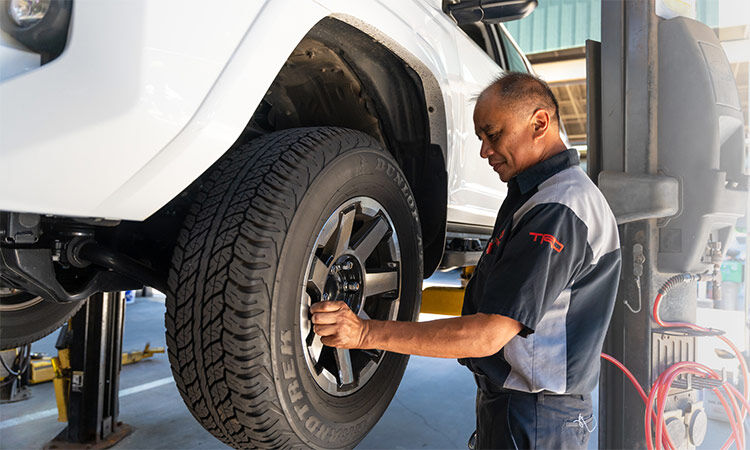Morris Tires: Where GMC Tire Service Meets Top Quality
Morris Tires: Where GMC Tire Service Meets Top Quality
Blog Article
Tire Service: The Effect of Weather
When it comes to ensuring ideal performance and safety and security when traveling, comprehending the effect of weather on tire solution is essential. From scorching heat to icy roadways, each weather element can significantly influence tire functionality and general driving experience. By diving into the impacts of differing climate problems on tires, chauffeurs can gain beneficial insights that might enhance their automobile's efficiency and longevity. In this conversation, we will check out the elaborate connection in between weather and tire service, losing light on the significance of weather-specific tire upkeep practices and factors to consider.
Warm and Tire Performance
When subjected to high temperatures, tires experience changes in efficiency that can dramatically influence vehicle safety and handling. The warm created from long term driving or warm climate problems creates the tire rubber to soften, leading to lowered tread life and increased wear.

Winter Effects
Cold weather condition problems can have a significant effect on tire efficiency and security. As temperature levels decrease, tire rubber can harden, leading to lowered grip on icy or snow-covered roadways. In cool weather condition, tires might additionally lose air stress a lot more rapidly, which can impact managing and fuel efficiency. Furthermore, cool temperatures can cause tire sidewalls to tense, boosting the threat of damages from holes or various other road hazards.
To alleviate the results of winter on tires, it is important to on a regular basis examine tire stress and inflate them to the supplier's recommended levels. Using winter or all-season tires designed for chilly weather condition problems can additionally improve grip and grip on icy or snowy roadways. Proper tire maintenance, including regular inspections for wear and damages, ends up being a lot more essential during chillier months to make certain ideal efficiency and safety and security.
Rainy Issues Influence
Throughout stormy conditions, tire efficiency and safety can be substantially affected by the wet roadway surface areas and minimized exposure. The walk pattern of tires plays a vital function in maintaining traction on wet roadways. Tires with worn-out treads are more vulnerable to hydroplaning, where a layer of water develops in between the tire and the roadway surface, leading to loss of traction. To fight this, motorists must consistently evaluate their tires for adequate tread deepness and think about buying tires specifically designed for damp conditions.
In addition, wet climate can additionally lower visibility, making it testing for vehicle drivers to see the roadway in advance clearly (GMC Tire Service). In such problems, it is important to adjust driving speeds as necessary and maintain a secure following distance to permit unexpected quits. Correctly inflated tires can additionally help in preserving control on wet roadways by supplying far better handling and grip
Snow and Tire Security
When driving in navigate to this site snowy problems, having the best tires can make a considerable distinction in security and efficiency. Winter tires are designed with unique rubber compounds and step patterns to provide far better grip on snow and ice compared to all-season tires.

It is vital to adhere to supplier guidelines when installing and using tire chains to prevent damages to the tires and vehicle. By selecting the appropriate tires, keeping proper rising cost of living, and thinking about additional traction aids like tire chains, chauffeurs can improve their safety and security when navigating snow-covered roads.
Weather-Related Tire Maintenance
Weather-related tire upkeep incorporates a range of techniques intended at making sure optimal tire feature and long life in various weather circumstances. One key facet of weather-related tire maintenance is tire pressure law. Evaluating tire walk frequently and changing tires when walk wear gets to a certain depth is essential for keeping traction and stability in negative weather.
Conclusion
In final thought, weather problems have a considerable influence on tire performance and security. From warmth influencing tire stress and wear to cool weather reducing grip, it is important to think about the climate when preserving and making use of tires.
In this discussion, we will certainly check out the intricate relationship in between weather condition conditions and tire solution, losing light on the importance of weather-specific tire maintenance methods and considerations.

Report this page